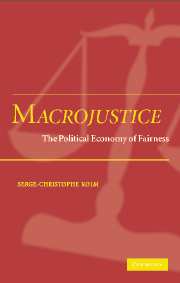Book contents
- Frontmatter
- Contents
- Presentation
- PART ONE BASES: CONSENSUS, FREEDOMS, AND CAPACITIES
- PART TWO OVERALL DISTRIBUTIVE JUSTICE: ELIE (EQUAL LABOUR INCOME EQUALIZATION)
- PART THREE COMPARISONS WITH POLICIES AND PHILOSOPHIES
- PART FOUR THE DEGREE OF COMMUNITY, EQUALITY, RECIPROCITY, AND SOLIDARITY
- 17 The degree of redistribution, solidarity, community, and reciprocity
- 18 Impartiality, consensus, and information
- 19 Disinterested judgments and the moral surplus
- 20 Communication and dialog
- 21 Impartialization to consensus
- PART FIVE COMPARISON WITH ECONOMICS' SOCIAL ETHICS
- References and bibliography
- Index
21 - Impartialization to consensus
Published online by Cambridge University Press: 31 July 2009
- Frontmatter
- Contents
- Presentation
- PART ONE BASES: CONSENSUS, FREEDOMS, AND CAPACITIES
- PART TWO OVERALL DISTRIBUTIVE JUSTICE: ELIE (EQUAL LABOUR INCOME EQUALIZATION)
- PART THREE COMPARISONS WITH POLICIES AND PHILOSOPHIES
- PART FOUR THE DEGREE OF COMMUNITY, EQUALITY, RECIPROCITY, AND SOLIDARITY
- 17 The degree of redistribution, solidarity, community, and reciprocity
- 18 Impartiality, consensus, and information
- 19 Disinterested judgments and the moral surplus
- 20 Communication and dialog
- 21 Impartialization to consensus
- PART FIVE COMPARISON WITH ECONOMICS' SOCIAL ETHICS
- References and bibliography
- Index
Summary
GENERAL OUTLOOK
Impartialization to consensus
In questions of distribution, individual self-interests are opposed by definition, and this constitutes an intrinsic impediment to consensus. This holds both for individuals' own interests and for those of the people they particularly favour. Individuals' impartial views avoid this impediment, but this raises two problems.
First, individuals may just not have an impartial view. They may, for instance, have no opinion at all when their own interest (or that of the people they favour) is not at stake. One may then try to discuss with these people to make them aware of the issue and induce them to consider some impartial viewpoint (in addition to their self-interest or biased preferences). This, however, may fail or may not suffice. The solution to this problem will consist of theoretically deriving individuals' implicit hypothetical impartial views from their actual purely self-interested or self-centered evaluations. The methods of this derivation are presented, discussed, and applied.
However, the second problem then intervenes: impartiality does not entail consensus, because there are various different impartial moral judgments – contrary to an implicit or explicit belief common among scholars (for instance, an ELIE distribution with any level of coefficient k has a type of impartiality). Yet, impartializations of individuals'views make an important progress toward consensus, because they erase essential causes of disagreements: those due to oppositions among self-interests or self-centered preferences.
Among the solutions to the problem that impartiality does not suffice for consensus, one has a virtue of consistency.
- Type
- Chapter
- Information
- MacrojusticeThe Political Economy of Fairness, pp. 336 - 360Publisher: Cambridge University PressPrint publication year: 2004



